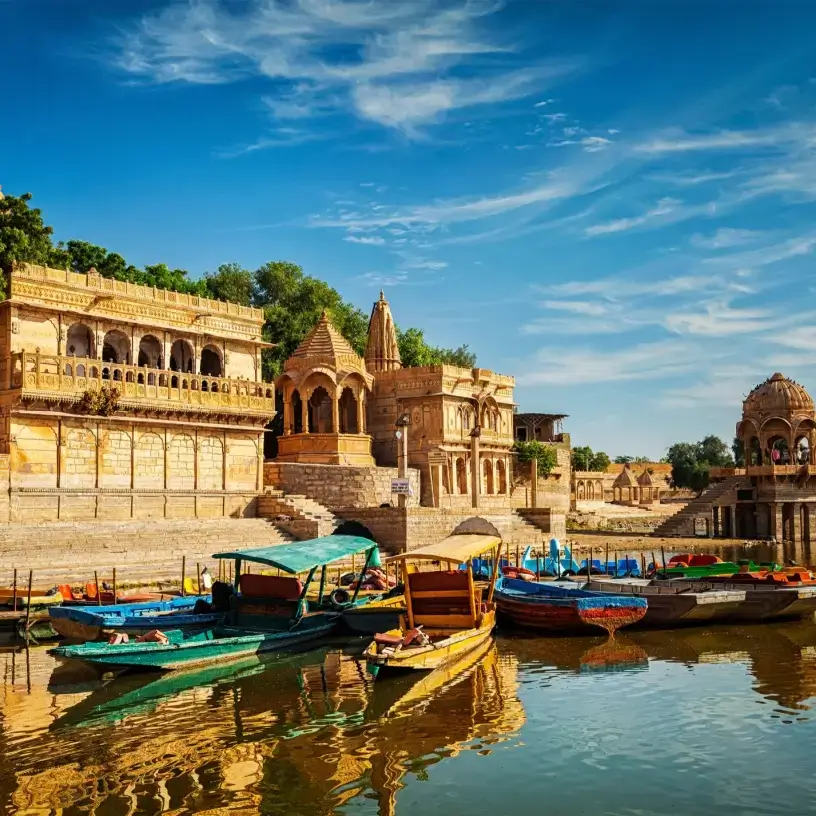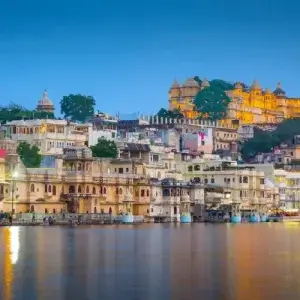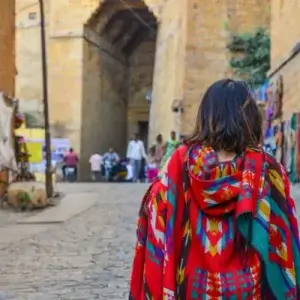Home / Compare Travel Insurance / Travel insurance for Ind…

Key takeaways
India is a melting pot of cultural, historical, spiritual and culinary experiences. To help protect yourself while you’re exploring India, you should consider the following:
- Before taking out travel insurance, consider your circumstances, such as who you’re travelling with, where you’re travelling to and what you plan on doing to help make sure your policy inclusions match your trip.
- Increasing your excess may reduce your travel insurance premium, but it’s wise to consider what a manageable excess amount is for you and your budget before you do this.
- Read your Product Disclosure Statement (PDS) and Target Market Determination (TMD) to understand the specifics of your policy and whether it’s suitable for you and your trip.
Why take out travel insurance for India
Taking out travel insurance for India can be a good idea to protect yourself financially against the unexpected, so that you can enjoy your trip with better peace of mind.
- It can be expensive to get medical treatment overseas if you fall ill or are injured, which is where medical cover can help.
- If you purchase travel insurance as soon as you make bookings or pay deposits for your trip, you may be covered if you unexpectedly need to cancel or reschedule it.
- Your policy can offer protection against theft or scams for your belongings, cash and credit cards by providing reimbursement if you suffer a loss.
Choosing the right travel insurance for India
If you’re looking to purchase a travel insurance policy for India, consider checking the following:
- Your policy exclusions. Every policy has exclusions, limits and sub-limits; it’s important to understand these limits and check whether you need any additional cover.
- Optional extras. If you are planning on rental a car, or taking part in adventurous activities, check your PDS to see if you’re covered or if you’re able to purchase extra cover as an add-on.
- Your type of insurance. If you’re taking your whole family on your Indian holiday, you may find a family travel insurance policy that covers you, your partner and your children better value than multiple single policies.
Expert tips for choosing the right travel insurance for India
Our Executive General Manager of General Insurance, Adrian Taylor, has some tips for matching the right policy to your trip.

Compare policies that suit your needs
Consider the cover that best suits your travel needs when deciding on an insurance policy. This might include medical treatment, travel delay and cancellation costs, theft of personal belongings and cover for rental vehicle excess if you plan to drive.
Declare your pre-existing medical conditions
When applying for travel insurance, always declare any pre-existing medical conditions and make sure your policy provides adequate cover for them.
Consider annual cover if you’re a frequent traveller
If you’re a frequent flyer overseas, you may find greater value in purchasing annual multi-trip cover to last for an entire 12 months, rather than a single trip travel insurance for each journey (but be sure to check the maximum travel days that are covered, per trip).
Getting travel insurance for India
Do I need travel insurance for India?

Could you afford medical treatment in India if you broke your foot falling out of a rickshaw? How about the cost of replacing everything that was in the suitcase lost in transit from Mumbai to New Delhi? Could you afford to pay for new flights if you need to get home quickly?
The unexpected can happen anywhere and anytime, whether you’re at home or abroad. Your overseas travel insurance is designed to provide financial protection against mishaps, injuries and accidents that can happen on your journey, and even before you depart.
While buying travel insurance for India isn’t mandatory, it may help with peace of mind and help you to enjoy a hassle-free holiday.
What should I consider before taking out travel insurance for India?
When looking for a travel insurance policy for your trip to India, you should take into account:
- Which parts of India you’re travelling to. Some parts of India may not be ideal to visit due to civil unrest, violent protests and terrorism.1 You can keep up to date with potential dangers by checking the travel warnings on Smartraveller.
- What activities you’ll be doing. This might include tours, adventure sports, renting a car or riding a motorcycle or scooter.
- The value of your cash, contents and personal belongings. Should you need to claim for the theft or loss of checked-in baggage and belongings, you should know the value of your possessions.
- The cost of your trip. This includes flights, other transportation, accommodation and attractions you’d like to visit, as well as the level of cover you will need for your trip.
- Who you’re travelling with. For example, if you’re planning to travel with your family, you may want to consider travel insurance for families instead of taking out individual cover. This will usually cover the policy holder as well as their spouse and dependents.
Inclusions and exclusions
What should my travel insurance for India include?

Travel insurance for India can come with different levels of cover, ranging from basic to comprehensive. A top-tier policy will typically offer cover for:
- Overseas medical treatment and hospital expenses
- Trip cancellation, amendment and delay costs
- Lost, damaged or stolen luggage and personal belongings
- Stolen cash
- Hire car excess
- Personal liability
- Some sports and activities
- Permanent disability and loss of income
- Accidental death
- Dependents under 18
- 24/7 emergency assistance.
You should always read the policy wording of your PDS, which outlines your cover, policy terms, sub-limits, conditions and exclusions.
What does my travel insurance for India exclude?
Travel insurance for India can come with a set of general exclusions. Generally, travel insurance doesn’t provide cover for:
- Travelling against government advice or warning (these are listed on the Australian Government’s website, Smartraveller)
- Negligence leading to loss or damage of personal belongings and valuables (e.g. leaving your luggage on a train)
- Trip cancellations due to change of mind or unpreparedness (e.g. forgetting to renew your passport)
- Extreme or high-risk sports and activities (e.g. white water rafting, skydiving)
- Claims caused by drug or alcohol-related activities
- Claims resulting from unlawful activities
- Loss or injuries from unapproved pre-existing conditions
- Acts of war, terrorism or civil unrest.
In cases like these, your insurance claim may be rejected. However, some things that are generally considered exclusions may be covered if you have a comprehensive insurance policy or you’ve purchased additional extras to cover things like adventure activities and extreme sports. You should always understand the specifics of what your international travel insurance policy covers by reading your policy documents.
Top concerns where travel insurance for India can help
Theft and scams

India has a high crime rate, including thefts, scams, robberies and assaults on foreign nationals, so it’s always best to be prepared with the right level of travel insurance cover. That way, you’ll be protected against things like baggage loss, credit card or cash theft or a loss of passport if it gets stolen.
You should always be on the lookout for pickpockets near popular attractions and any suspicious activity, as unsuspecting tourists may be at a higher risk of being fleeced.
Common scams in India include, but are not limited to:
- Card skimming at ATMs or establishments in tourist areas. Fraudsters use skimming devices to copy people’s bank card details onto a blank card to use.
- Tour package scams. Fraudulent operators will sell tourists a fake tour package, or a guide will tell tourists the package they have is invalid and then sell them a ‘valid’ one.
- Dodgy guide services. Criminals will pose as tour guides and take foreigners on ‘tours’ only to rob or take advantage of them at an opportune moment.
- ‘Faster’ services. Scalpers or agents will claim to provide a ‘faster’ service for a fee. For example, if you’re going on a boat ride, the tour guide may make you wait or provide a slow service, then offer a faster service for a fee.
We recommend that travellers look into a comprehensive travel insurance policy that offers coverage for theft of cash and stolen, lost or damaged belongings. By having a travel insurance plan, you may save yourself from significant financial loss if your trip to India goes awry.
Driving overseas
India is known for its high number of road accidents due to poor driving, traffic conditions and constant disregard for road rules and safety. If you’re planning on renting a vehicle on your trip, you will need to exercise care and safety when driving, and have an international driver’s license.
Cars often share the roads with pedestrians, carts and livestock. It’s also not uncommon to encounter vehicles travelling on the wrong side of the road or cars driving at night without headlights.
If you are involved in a car accident, your rental car company will most likely charge you an excess to cover the cost of repairs for your hire car. Generally, comprehensive travel insurance can cover this rental car excess and most overseas medical expenses in case of injury on the roads.
Healthcare
If you were to suffer a serious illness or injury, chances are you would require hospitalisation or medical evacuation. These costs could set you back tens of thousands of dollars if you don’t have sufficient medical cover as part of your travel insurance for India. But if you do, you may receive reimbursement for the healthcare costs involved in a medical emergency or other injuries. Depending on your medical coverage, your policy may even cover repatriation.
You should also make sure you’re caught up with all of your vaccinations, as your travel insurer may not cover medical issues from a vaccine-preventable illness.
Meet our travel insurance expert, Adrian Taylor
As a General Insurance expert with over 13 years’ experience in financial services, Adrian Taylor believes in educating customers about the importance of travel insurance so that anyone can kick back and make the most of their time away from home. While no one wants a disrupted holiday, a suitable travel insurance policy can provide a financial safety net for yourself, your belongings and your trip in case things go wrong.
Want to know more about travel insurance?
1 Smartraveller. India. Last updated October 2023. Accessed October 2023.


